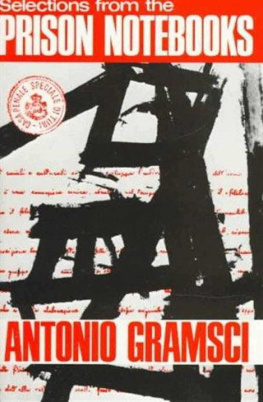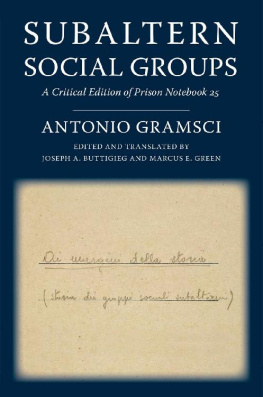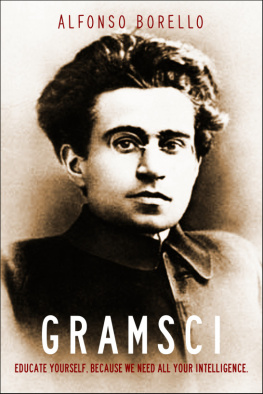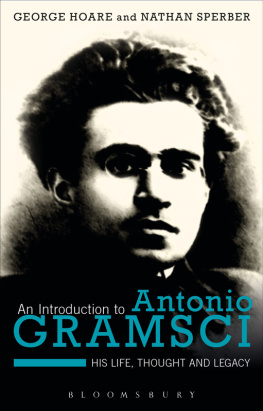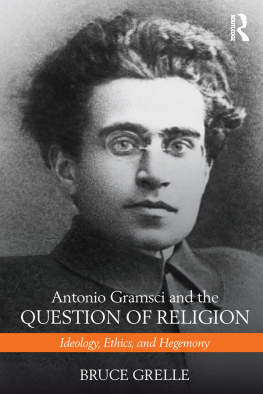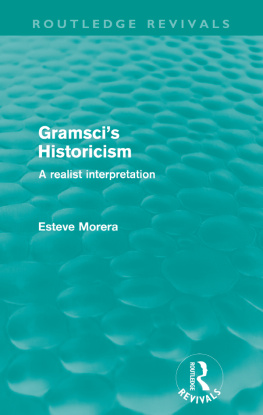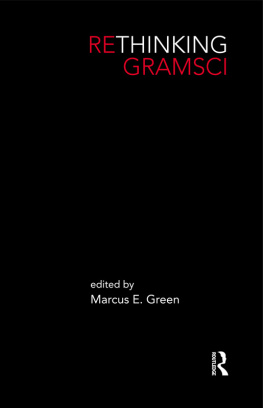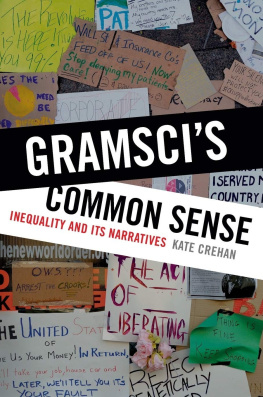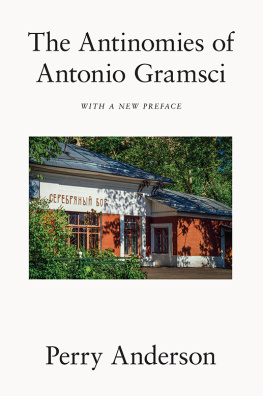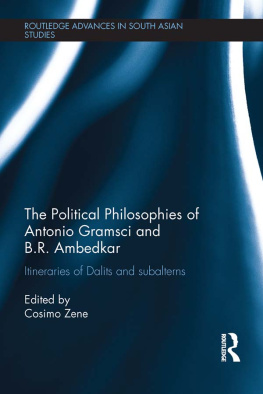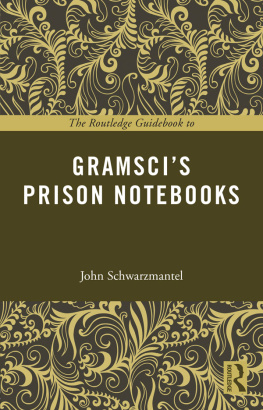SELECTIONS FROM THE
PRISON NOTEBOOKS
OF
ANTONIO GRAMSCI
EDITED AND TRANSLATED BY
QUINTIN HOARE
AND
GEOFFREY NOWELL SMITH
Contents
ACKNOWLEDGEMENTS
p.viii
The editors would like to express their thanks to the Istituto Gramsci in. Rome, holders of the copyright on Gramsci's Prison Notebooks, for permission to publish the present selection and for allowing them to consult and to copy from the photostat of Gramsci's manuscript in the possession of the Institute. Particular thanks for their assistance are due to Dr Elsa Fubini and Prof. Valentino Gerratana of the staff of the Institute, and to the director, Franco Ferri. The initiative for the publication of this volume came from Roger Simon and Steve Bodington, who have supervised its progress throughout, making many invaluable suggestions, and without whose stimulus the work would have taken even longer to complete.
We would like to acknowledge our indebtedness to certain books without which the General Introduction could not have been written. The most important of these sources is the series of books on Turin working-class history and the early history of the Italian Communist Party by Paolo Spriano. Also indispensable were Giuseppe Fiori's biography, the Tasca archive material published in the Annali Feltrinelli in 1 960 and 1 966, and the Marx Memorial Library's collection of Comintern congress reports, etc.
Geoffrey Nowell Smith would like to thank all those who helped or took part in the preparation of his sections of this edition, in particular Rosalind Delmar, a constant collaborator on the volume from its inception; John Merrington, Ian Steedman, Norman Geras and Michael Evans; and Shirley Hill, who produced a flawless typescript of his part of the translation.
PREFACE
p.ix
EXISTING EDITIONS
The present edition comprises a selection of texts from the Notebooks ( Quaderni del car cere ) written by Gramsci in prison between 1929 and 1935. There is still no critical edition of the Quaderni in Italian, though one is in course of preparation at the Istituto Gramsci in Rome. A preliminary edition containing the bulk of Gramsci's original material, excepting translations and rejected drafts, was brought out by the Turin publisher Einaudi in six volumes between 1948 and 1 95 1, under the editorship of Felice Platone. The same edition contains a volume of Prison Letters ( Lettere dal carcere, 1947 ), now superseded by a more complete edition, and a series of volumes of the pre- 1 926 writings, from the period prior to Gramsci's imprisonment. Our selection is based on this Einaudi edition of the Quaderni, with the addition of one or two previously unpublished texts and with a slight rearrangement of the order in certain places. References to the Einaudi or to other selections or translations of Gramsci's works are given in these pages as follows:
Quaderni
MS. II materialismo storico e la filosofia di Benedetto Croce , 1948.
Int. Gli intellettuali e lorganizzazione della cultura , 1949.
Ris. II Risorgimento , 1949.
NM. Note sul Machiavelli, sulla politica e sullo Stato moderno , 1949.
LVN. Letteratura e vita nazionale , 1950.
PP. Passato e presente , 1951.
Letters
LC. Lettere dal carcere , edited by S. Caprioglio and E. Fubini, Nuovo Universale Einaudi, Turin 1965.
Other editions referred to
GF. 2000 pagine di Gramsci , edited by N. Gallo and G. Ferrata, Vol. I, Nel tempo della lotta, 1914-1926, Il Saggiatore, Milan 1964. On pp. 797-819 of this volume is published Gramscis important essay on the Southern Question (written immediately prior to his arrest): Alcuni temi della quistione meridionale , hereafter referred to as Alcuni temi .
(Vol. II consists of letters. Two further volumes are in preparation.)
p.x
OC. Oeuvres choisies de Antonio Gramsci , Editions Sociales, Paris, 1959.
A previous English translation of some of the works of Gramsci contained in this volume, together with one or two of the earlier writings, translated and edited by Louis Marks, was published by Lawrence and Wishart in 1957, under the title The Modern Prince and other Essays . There also exist a number of Italian anthologies and of translations of Gramscis works into other languages. For a selective bibliography of works of and about Gramsci we refer the reader to the note at the end of the English translation of Giuseppe Fioris biography of Gramsci ( Antonio Gramsci, Life of a Revolutionary , translated by Tom Nairn, New Left Books, London 1970).
The problem of making a selection from Gramscis Quaderni or Prison Notebooks is complicated by two factors: the fragmentary character of the writings themselves, and the uncertain status of the Notebooks in Gramscis intentions. From references in the Notebooks and in Gramscis letters from prison it is possible to obtain some indication of how Gramsci intended his work to be understood. Soon after his arrest he wrote to his sister-in-law Tatiana (19 March 1927: LC. pp. 57-60) about a project of writing something fr ewig (for ever), something which would also serve to absorb him and give a focus to [his] inner life. He mentions a plan for a history of the Italian intellectuals, together with studies on linguistics, on the theatre of Pirandello and on serial novels and popular literary taste. However, in another letter to Tatiana (15 December 1930: LC. pp. 389-92) he writes: thinking disinterestedly or study for its own sake are difficult for me... I do not like throwing stones in the dark; I like to have a concrete interlocutor or adversary, and he speaks of the polemical nature of his entire intellectual formation. Early in 1932, in a note in one of his Quaderni (Q. XXVIII), he describes a programme of principal essays wider in scope than the previous one, with more political and philosophical content, fairly close in its general outlines to what has actually come down to us in the Quaderni . It is this programme which forms the basis of the ordering of the material of the Notebooks carried out by the Einaudi editors after the war. Even so, many difficulties remain. Ill health and the unavailability of books in the prison forced him to leave unfinished, to abandon
p.xi
or to modify certain plans. With his transfer to the prison clinic in 1933 and consequent partial recovery, he began to recopy, reorder and rework much of the material from the earlier notebooks. But he did so with an extra caution, eliminating any surviving words or phrases, like the name of Marx or the word class, which might attract the attention of the censor and so cause his work to be brought to an end. Most significantly of all, in a note in one of the Quaderni entitled Questions of Method (see below pp. ) he offers a warning, ostensibly about Marx but equally if not more applicable to himself against confusing unfinished or unpublished work with works published and approved by an author during his lifetime. In the same note he also refers to the importance and to the inherent difficulties of reconstructing the intellectual biography of an author. To perform such a task, in relation to the Prison Notebooks, would be an immensely valuable but also intricate labour. In default of this, however, and given the circumstances in which the texts were written, any unequivocal assertions about the aim and status of Gramscis theoretical project as contained or sketched out in the Notebooks are necessarily speculative and must be recognised as such.
THIS EDITION: SELECTION AND TRANSLATION


